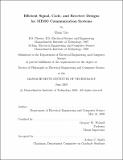Efficient Signal, Code, and Receiver Designs for MIMO Communication Systems
Author(s)
Yao, Huan
DownloadTR668 (2.715Mb)
Metadata
Show full item recordAbstract
The so-called diversity-multiplexing tradeoff characterizes the fundamental interaction between the robustness and capacity gains obtainable from multiple-input and
multiple-output (MIMO) systems in fading environments. This thesis develops practical schemes for approaching the optimal tradeoff in various delay and complexity
regimes. We focus on a two-transmit and two-receive antenna system, in which the
receiver has channel knowledge, but the transmitter does not.
We first investigate uncoded transmission. We propose a class of lattice-reduction-
aided low-complexity detectors that can achieve near maximum likelihood performance and the best diversity-multiplexing tradeoff achievable by any length-one code.
We also design a family of structured space-time block codes that we call tilted-
QAM codes. It achieves the optimal infinite-delay tradeoff with the necessary minimum delay of two, answering a previously open question. It uses constellation rotation
ideas to effectively spread information across space and time. We identify rotation
angles that are universally optimal at all rates in terms of a determinant criterion.
We further develop efficient coding schemes using long error correction codes.
In particular, we combine them with tilted-QAM codes using hard and soft decision decoding to obtain good performance at moderate SNR. These new systems are
compared to orthogonal space-time coded systems, which we show to achieve near optimal performance at low SNR. We also examine traditional sequential versions and
develop new block versions of the Bell Labs layered architecture (BLAST). While
some of these can in principle reach the performance limit at all SNRs, we show they
also have various practical problems.
Finally, for the case where no channel knowledge is available, we present a geometric view of the signal design problem. This view reveals how training based
approaches can achieve the optimal (non-coherent) diversity-multiplexing trade
Description
Thesis Supervisor: Gregory W. Wornell
Title: Professor
Date issued
2004-09-15Series/Report no.
Technical Report (Massachusetts Institute of Technology, Research Laboratory of Electronics);668